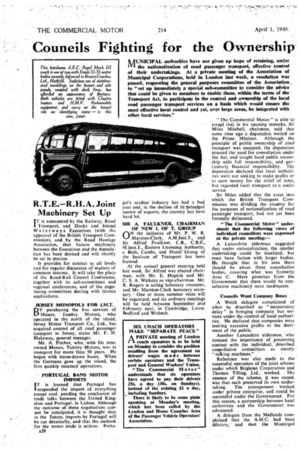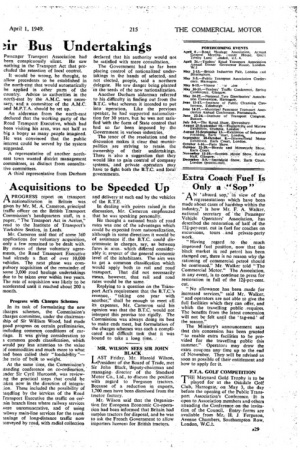Councils Fighting for the Ownership Ar Bus Undertakings
Page 4

Page 5

If you've noticed an error in this article please click here to report it so we can fix it.
R.T.E.—R.H.A.Joint Machinery Set Up
IT is announced by the Railway. Road Transport, and Docks and Inland Waterways 'Executives (With the approval of the British Transport Commission), and_ by the Road Haulage Association, that • -liaison machinery between the Executives and the Association has beendevised and will shortly be set in motion.
It provides for contact at all levels and for .regular discussion of matters of common interest. It will take the place of the Road-Rail Central Conference, together with its sub-committees, and regional conferences, and of the nego, hating committees dealing with licence applications.
JERSEY MONOPOLY FOR J.M.T.
BY purchasing the bus services of Messrs. Tantivy Motors, who operated in the north of the island., Jersey Motor Transport Co., Ltd., has acquired control of all road passenger transport in Jersey, states Mr. F. II Blakeway, general manager.
Mr. A. Pitcher, who, with his sons, owned Messrs. Tantivy Motors; was in transport for more than 50 years. He began with horse-drawn buses. When the Germans -gave up the island, the tirm quickly resumed Operations.
PORTUGAL BANS MOTOR IMPORTS
IT is learned that Portugal has 'suspended the importof everything except coal, pending the conclusion of trade talks between the United Kingdom and Portugal, in Lisbon. Although the outcome of these negotiations cannot be anticipated, it is thought that. in the future, imports by Portugal will be cut drastically, ancl that the outlook for the motor trade is serious. Forth
a28 gal's sardine industry has had a had year and, in the decline of its 'principal source of exports, the country has been hard hit.
SIR •A. FAULKNER, CHAIRMAN OF NEW I. OF T. GROUP /IN the initiative of Mr. P. W. R.
• Marston-Clark, ANLInst.T.,.aid Sir Alfred Faulkner, C. B., C. B.F., M.Inst.T., Eastern Licensing Authority, a Beds, Cambs. and Hunts Group of the Institute Of Transport has been formed.
At the annual general meeting held last week, Sin' Alfred was elected chairman, with Mr. E. Hopkin and Mr. C. S. A. Wickens as vice-chairmen. Mr. R. Rogers is acting honorary treasurer, and Mr. Marston-Clark honorary secretary. , One or more summer visits will be organized, and six ordinary .meetings will be held between September al-id February next, in Cambridge, Luton, Redford and Wisbech. "The Commercial Motor" is able to reve.al that in his opening remarks, Sir Miles Mitchell, chairman, said that some time ago a deputation waited on • the Prime Minister. Although the principle of public ownership of rdad transport was accepted, the deputation. stressed -the need for consultation under the Act, and sought local public ownership with full responsibility, and particularly financial responsibility. The deputation declared that local authorities were not seeking to make profits or to earn money for the relief of rates, but regarded local transport as a social service.
Sir Miles added that the areas into which the British Transport Commission was dividing the country for the purposes of nationalization of road passenger -transport, had not yet been formally delineated.
"The Commercial Motor" understands that the following views of individual councillors were expressed at the private meeting:—
A Lancashire alderman suggested that under nationalization, the smaller undertaking .could be localized, but must have liaison with larger bodies. He thought. that in his area there should be about three consultative bodies, covering what was' formerly Area C. Mere promises from the Government that there would be consultative machinery were inadequate. .
Councils Want Company Buses A Welsh delegate complained . of what he described as "unnecessary delay" in bringing company bus services under the control of local authorities. He declared that companies were 'making excessive profits to the detriment of the public.
Another Lancashire alderman, who stressed the importance of preserving • contact with . the individual, described consultative committees as merely `! talking machines."
Reference was also made to the. successfuloperation of the joint scheme under which Brighton Corporation and Thomas Tilling, ,Ltd., worked, The essenceof the scheme, it was stated. was thateach preserved its own under
taking. The arrangement Worked under private enterprise, and could be successful under the Government. For this -reason, a partnership between local authorities and the Government was advocated.
A delegate from the Midlands cornplained that the AtM.C. had been dilatbry,' and that the Municipal Passenger Transport Association had been conspicuously silent. He saw nothing in the Transport Act that precluded the retention of local control.
It would be wrong, he thought, to allow precedents to be established in the north-east that would automatically be applied in other parts of the country. Advice to authorities in the north-east by the A.M.C. was necessary, • and, a committee of the A.M.C.
and M.P.T.A. should be set up. • An alderman from the north-east declared that the working party of the Road Transport Executive, which had been visiting his area, was not half as big a bogey as many people imagined. He was convinced that the public interest could be served by the system suggested.
A representative of another, northeast town wanted district management committees, as distinct from consultative committees.
A third representative from Durham declared that his authority would not be satisfied with mere consultation.
The Government had so far been placing control of nationalized undertakings in the hands of selected, and not elected, people, said a northern delegate. He saw danger being planted an the Seeds of the new nationalization.
Another Durham alderman referred to his.difficulty in finding out from the B.T.C. what schemes it intended to put into operation. Like the previous. speaker, he had supported nationalization for 30 years, but he was not satisfied With the form of State control that had so far been imposed by the Government in various 'industries.
The tenor of the resolution and the discussion makes it clear that municipalities are striving to retain, the ownership of their undertakings. There is also a suggestion that they would like to gain control of company systems, and private ,operators may have to fight both the B.T.C. and Ibcal • governments.


























